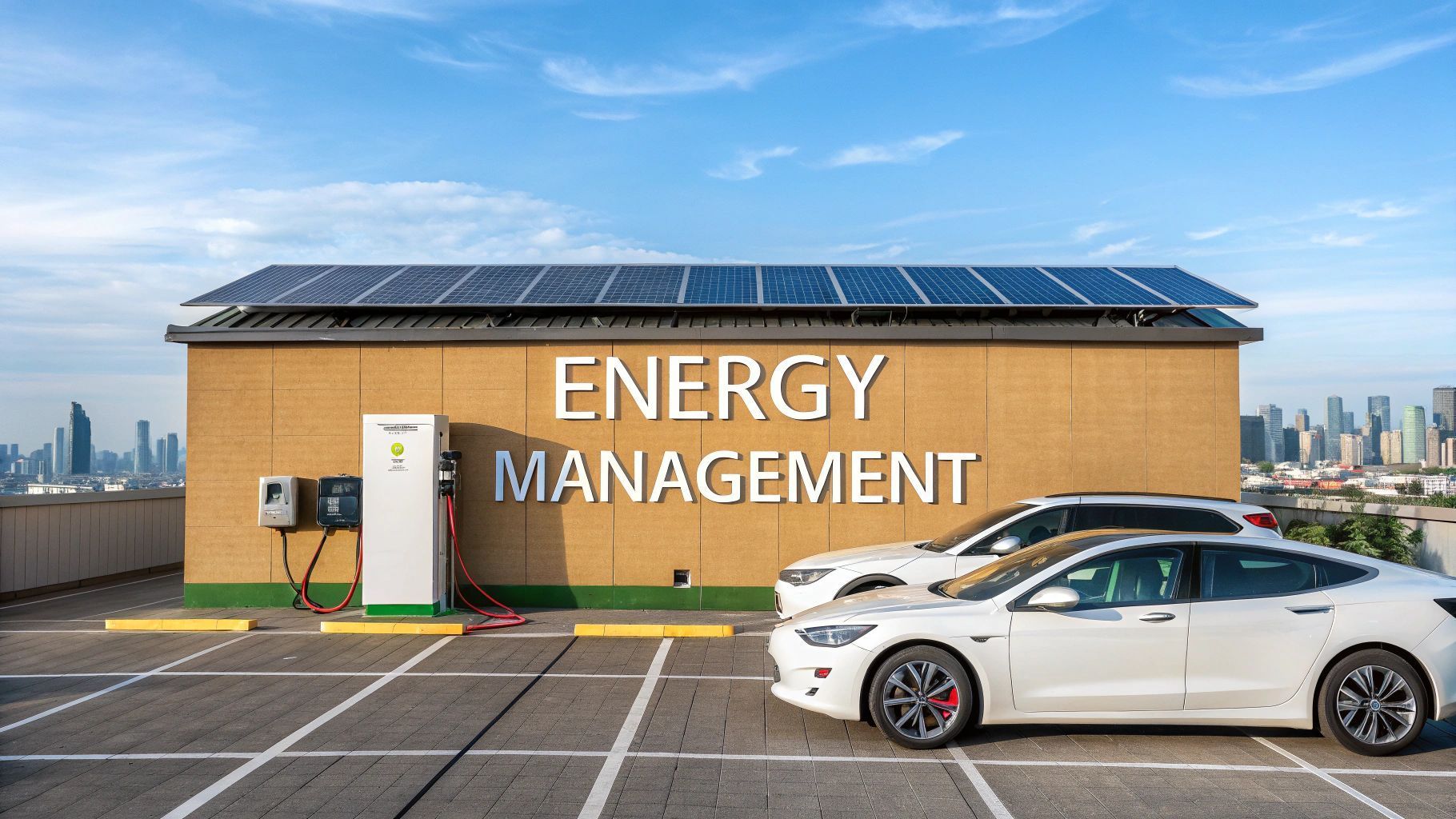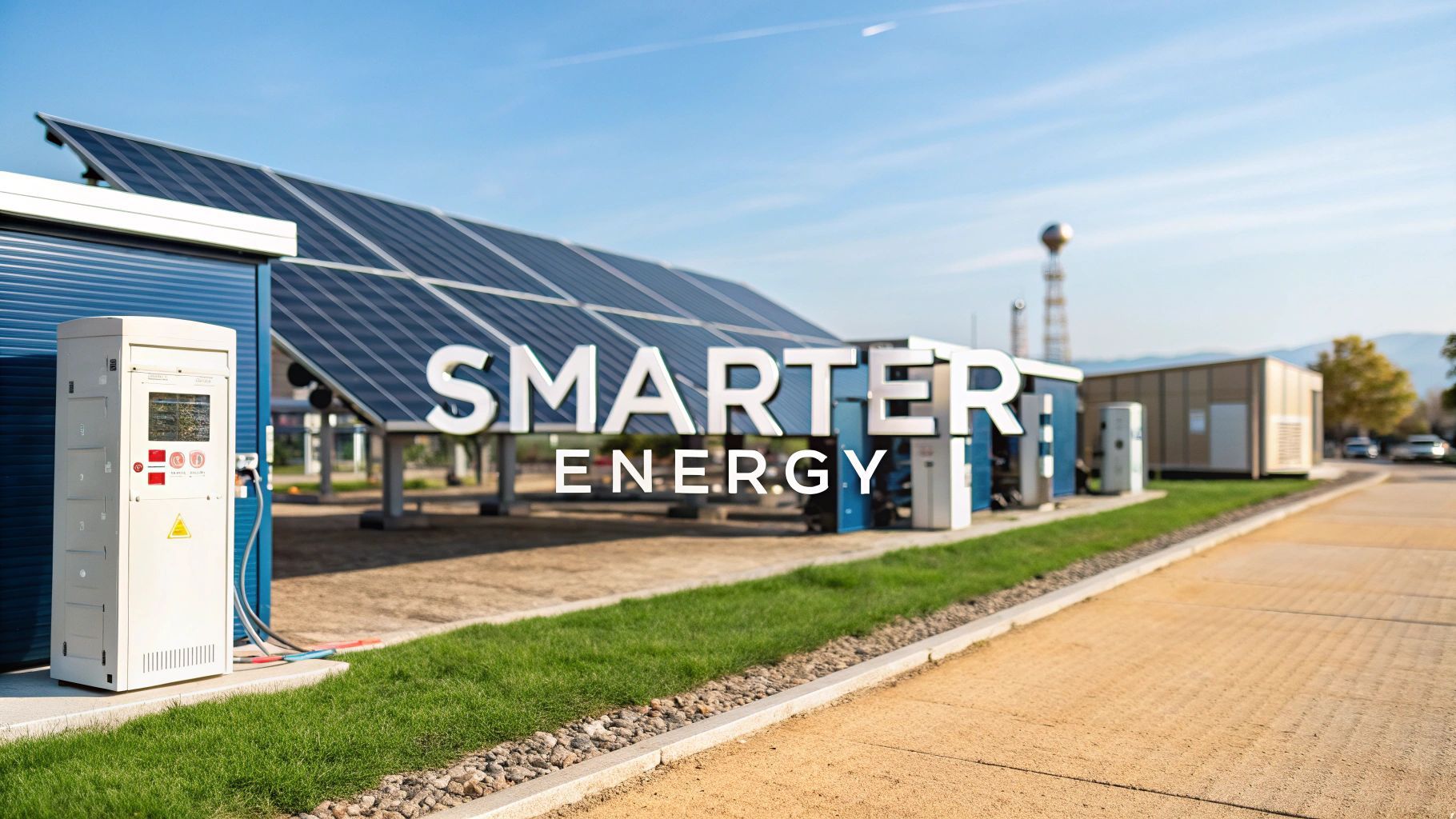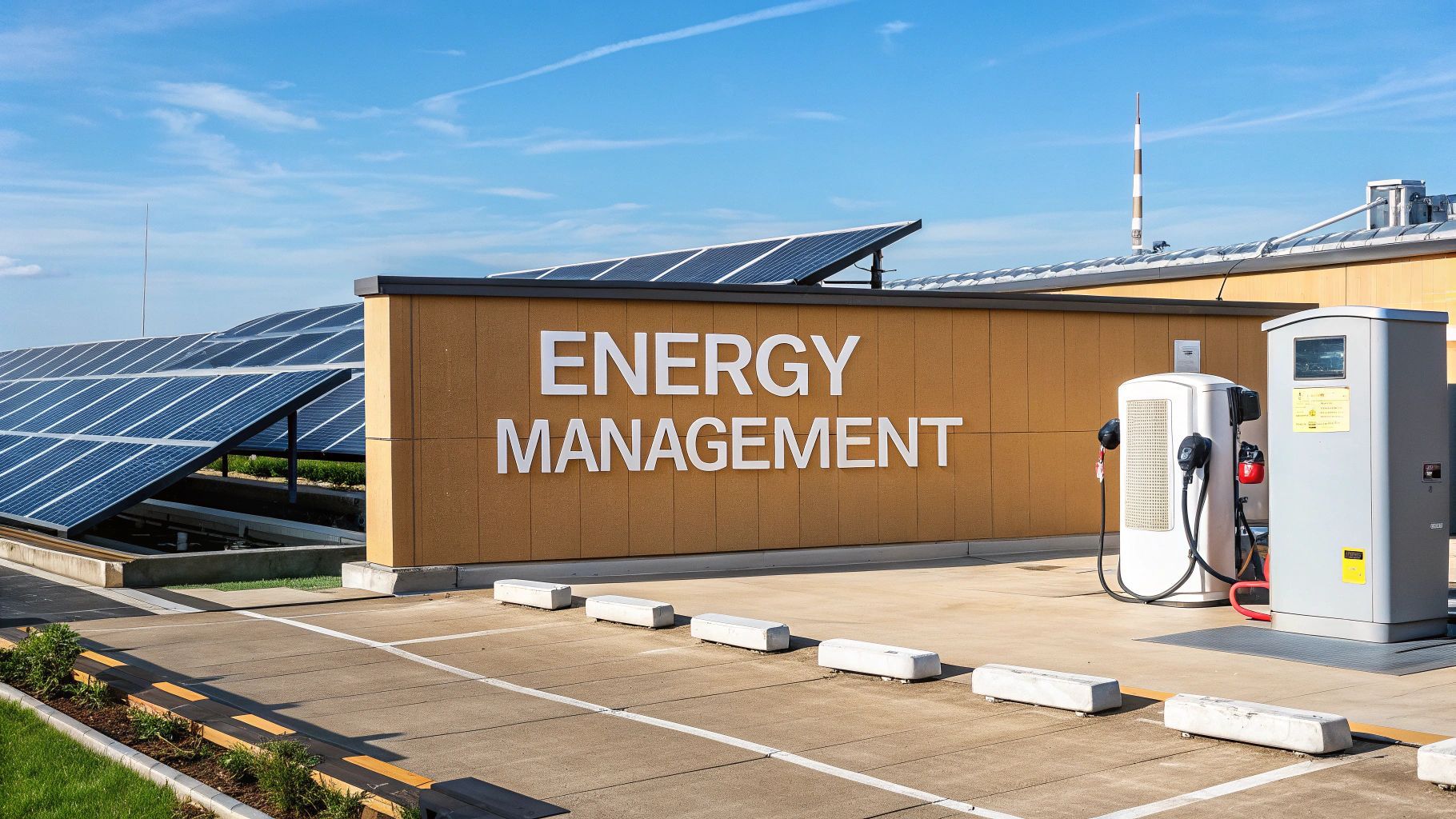What Plugs Do They Use in Egypt? Essential Travel Guide
Right, let's get this sorted. If you are heading to Egypt, one of the first practical things to figure out is how you will keep your devices charged. The last thing you want is a dead phone when you are trying to capture the pyramids at sunset.
Straight to the point: Egypt uses two main types of plugs, Type C and Type F . This means your standard three-pin UK plug simply will not fit into an Egyptian wall socket. Packing a travel adaptor is not just a good idea; it is essential.
Your Essential Guide to Egyptian Power Sockets
Getting to grips with local electrical standards is a must, whether you are travelling for business or pleasure, especially as Egypt continues to modernise its energy infrastructure. Unlike the familiar three-pin system we have in the UK, Egypt uses the two-pin sockets that are common across most of Europe.
You will encounter both Type C and Type F sockets. They both have two round pins but they differ slightly in how they are earthed. The good news is the country runs on a voltage of 220V at a frequency of 50Hz , which is very close to the UK's 230V standard. For most modern electronics like laptops and phone chargers, this difference is negligible and they will work just fine with a simple plug adaptor.
To make it even clearer, this simple map lays out the core components of Egypt's power system.
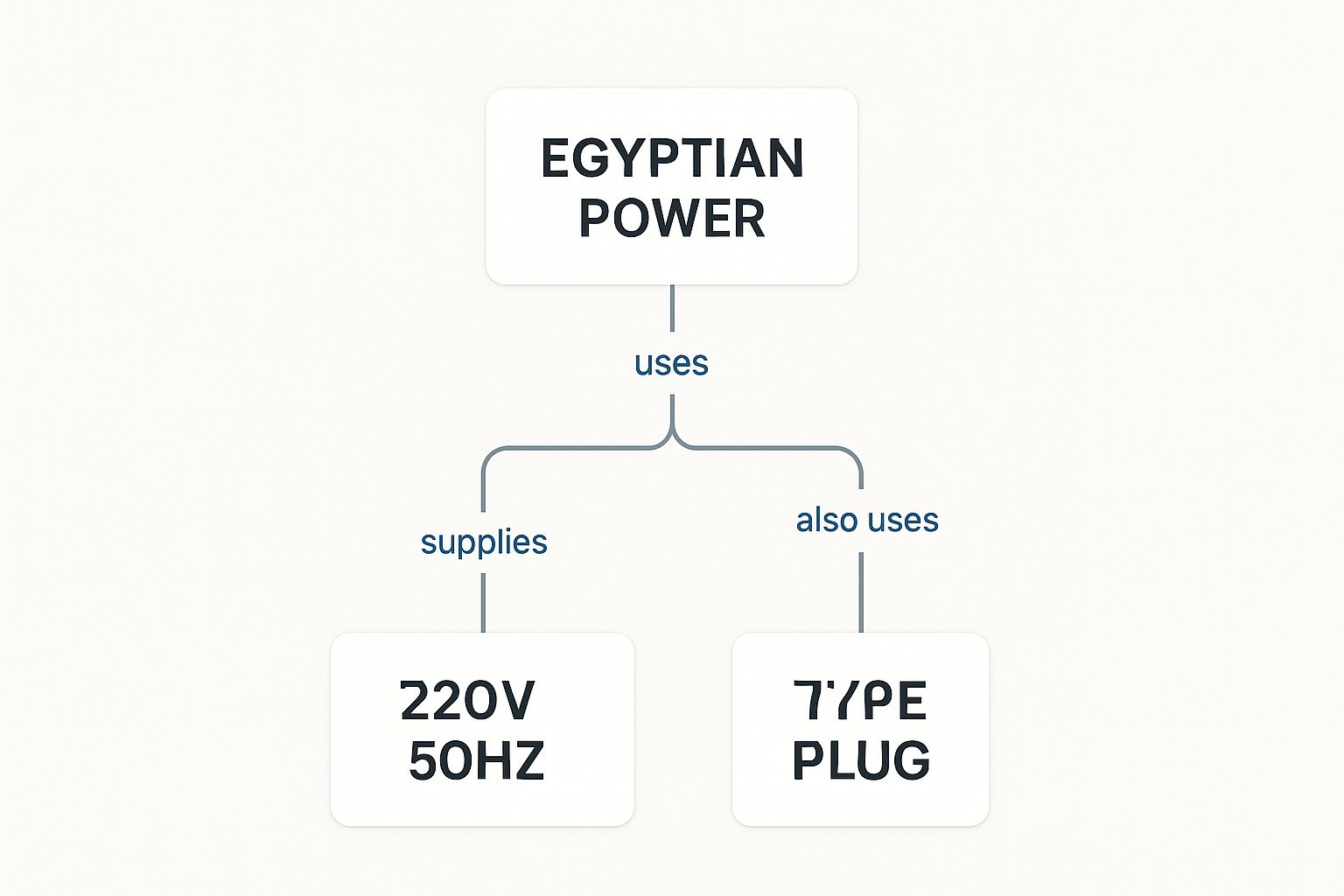
As you can see, the two compatible plug types are tied to the country's voltage and frequency. This setup is crucial for everything from charging your camera to connecting more sophisticated gear like mobile EV charging units, which need to be fully compatible with the local grid. Managing power from constrained grid connections is a growing area of interest, making robust and adaptable technology vital.
While Egypt’s system is fairly standard for the region, remember that other African nations have different setups. For instance, if your travels take you further, you might find our guide to electric plugs in Tanzania useful.
UK vs Egypt Electrical Standards At a Glance
For those of us used to the UK system, a quick side-by-side comparison can really help clear things up.
| Feature | United Kingdom (UK) | Egypt |
|---|---|---|
| Plug Type | Type G (3 rectangular pins) | Type C & Type F (2 round pins) |
| Voltage | 230V | 220V |
| Frequency | 50Hz | 50Hz |
| Adaptor Need | Not applicable | Yes , a travel adaptor is required for UK devices. |
So, the key takeaway is simple: the voltage is close enough not to be a problem for most gadgets but you absolutely need an adaptor to physically connect your UK plugs to Egyptian sockets.
Getting to Grips with Type C and Type F Sockets
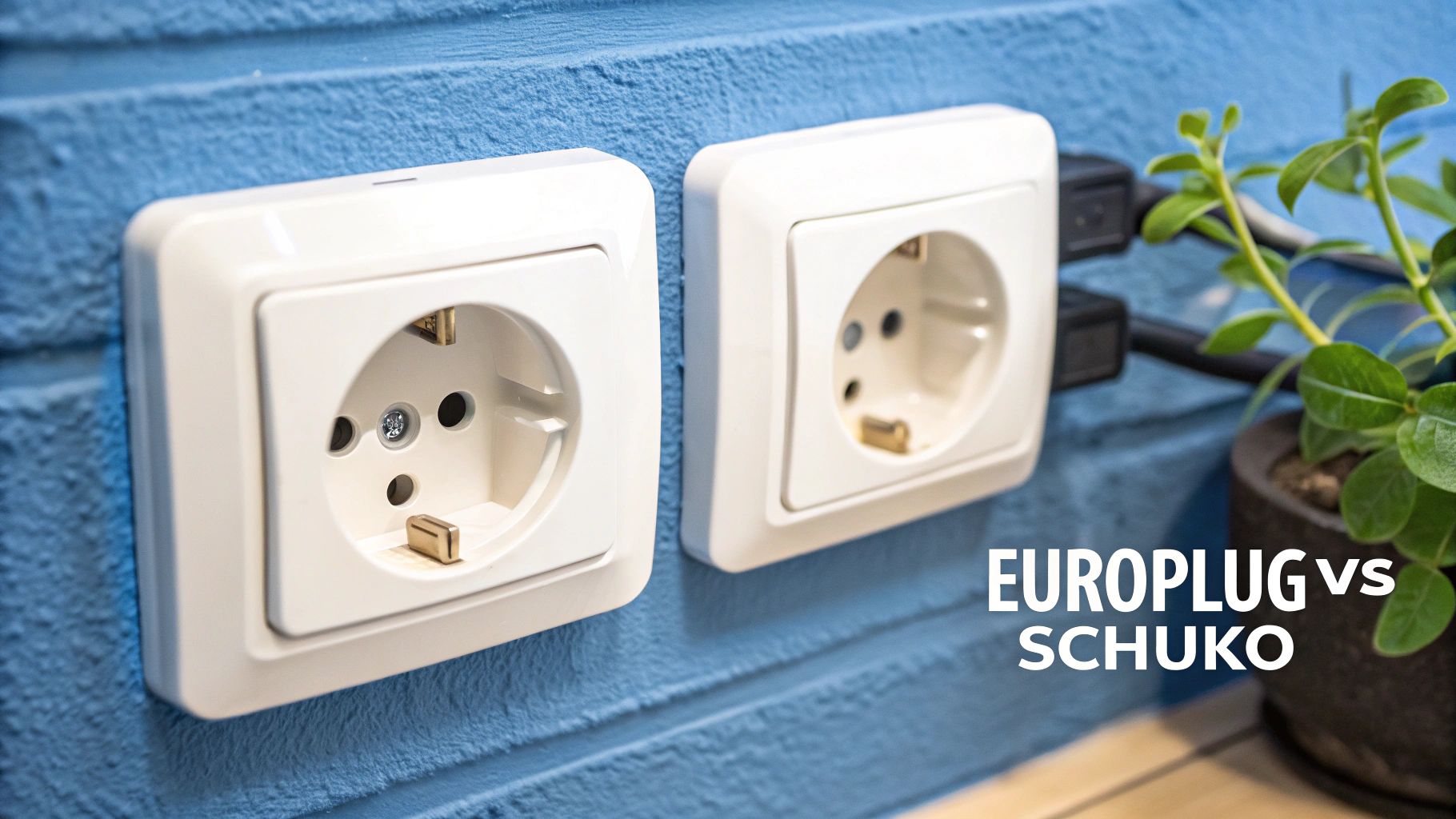
Trying to figure out foreign plug sockets can feel like a puzzle but it is actually quite straightforward once you meet the two main players in Egypt: Type C and Type F .
Think of the Type C ‘Europlug’ as the minimalist of the plug world. Its simple, ungrounded two-pin design makes it a versatile traveller, fitting neatly into most sockets across Europe. It is the thin, flat plug you will typically find on low-power devices like your phone charger.
Then there is its bigger, tougher cousin, the Type F ‘Schuko’ plug. It shares the same two round pins but adds grounding clips on the top and bottom for a crucial layer of safety. This makes it the go-to choice for higher-power appliances where an earth connection is non-negotiable, particularly for rapid EV charging.
What This Means for Travellers
So, what does this actually mean when you are packing your travel adaptor? The most important thing to remember is the relationship between the two.
A Type C plug will happily fit into a Type F socket because the socket is designed to accommodate the simpler, ungrounded plug. The reverse, however, is not true. A bulkier Type F plug just will not squeeze into a shallower, ungrounded Type C socket.
This is not just a minor inconvenience; it is a critical detail, especially when powering more demanding equipment. For businesses deploying technology like mobile EV charging units or connecting to distributed energy resources, ensuring the connectors are compatible with the dominant Type F sockets is fundamental. These sockets provide the essential grounding needed for safe operation—a vital consideration for any system that handles significant electrical loads, especially when drawing from constrained grid connections.
Knowing this helps you choose an adaptor that will work everywhere, not just some of the time. Your best bet is to grab a universal adaptor designed to fit both Type C and F sockets. That way, you are prepared for any outlet you come across, whether it is in a hotel in Cairo or at an emerging rapid EV charging point.
Will Your UK Devices Work in Egypt?
For anyone travelling from the UK, there is good news. The short answer is yes, most of your devices will work just fine.
Egypt's 220V standard is a very close match to the UK's 230V . Modern dual-voltage electronics—think phone chargers, laptops and camera batteries—are built to handle this slight variation automatically, so you can plug in without a worry.
Of course, it always pays to double-check for yourself. The easiest way to become your own tech expert is to look for a small label on your device’s plug or power brick.
If you spot text that says ‘INPUT: 100-240V, 50/60Hz’ , your device is dual-voltage and is perfectly safe to use in Egypt with a simple plug adaptor. This label is essentially your device's passport, confirming it can handle different power grids around the world. Understanding these details is crucial, not just for personal travel but for large-scale applications such as grid scale batteries and combined on site renewables, which must be precisely matched to local specifications. While many countries have similar voltage, it's a detail worth checking, as you can see in our guide to voltage for Mexico and EV charging.
When You Might Need More Than an Adaptor
The small difference between 220V and 230V is rarely an issue for modern gadgets. The real challenge is the plug shape, which is why UK travellers will need to pack the right adaptors. It is a common purchase—in fact, sales of travel plug adaptors for Egypt jump by over 30% each year during peak holiday seasons.
However, some older or simpler appliances might be single-voltage. A hairdryer or a set of hair straighteners from the UK, for instance, might only be rated for '230V'. Plugging this into a 220V socket is usually okay but you might notice it runs with slightly less power.
The real danger comes when you plug a lower-voltage device (like one from North America rated at 120V) into a higher-voltage system like Egypt's. Without a step-down converter to reduce the voltage, the appliance would quickly overheat, leading to permanent damage. The bottom line? Always check the label.
Choosing the Right Travel Adaptor for Your Trip
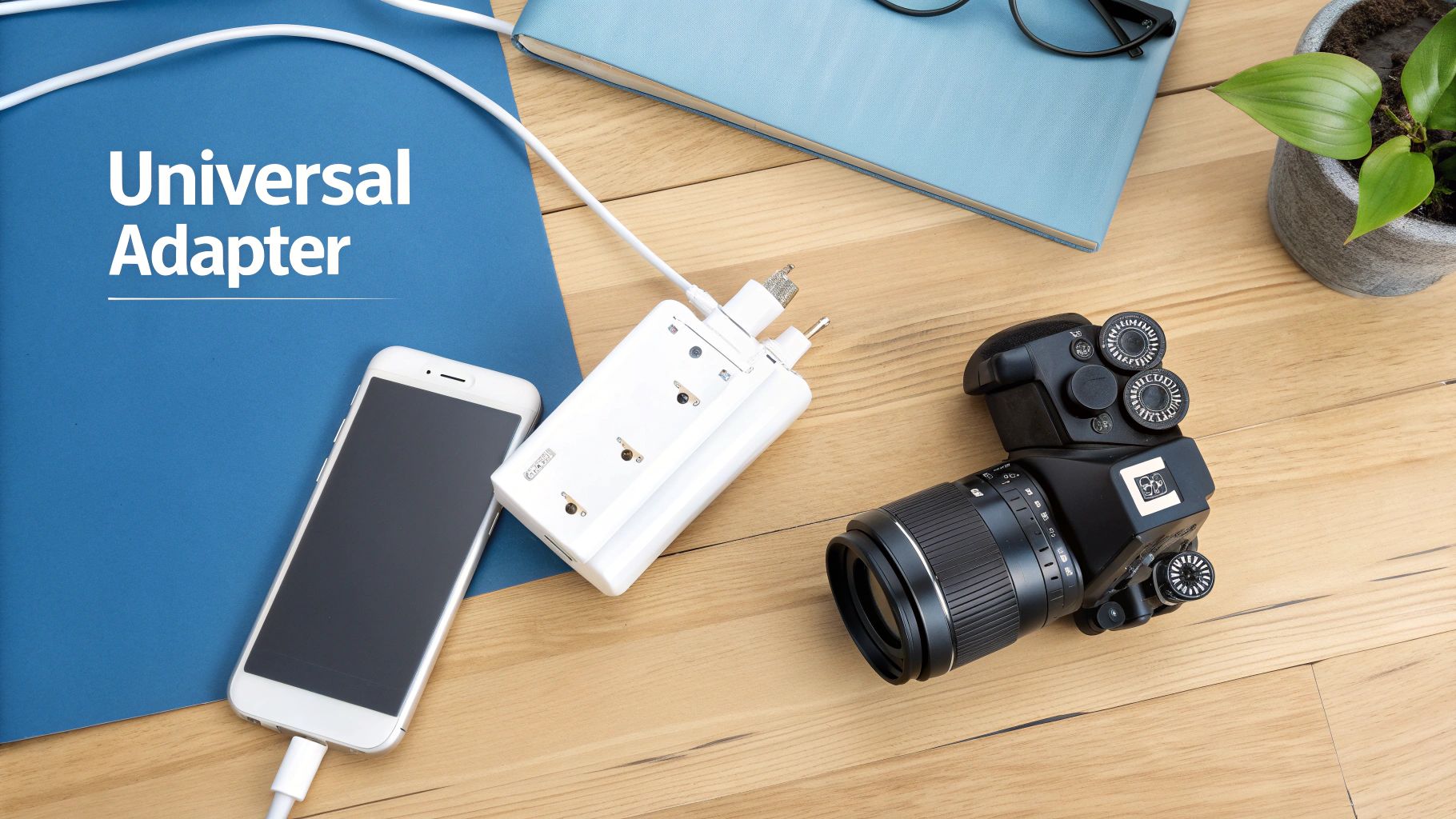
Walking into an electronics shop and staring at a wall of travel adaptors can be a bit much. The choice usually boils down to a simple, single-country adaptor or one of those versatile, all-in-one universal models. A single adaptor is neat and compact but it is a one-trick pony. A universal model, on the other hand, can be used across multiple countries, making it a much better long-term investment for any regular traveller.
A universal adaptor might seem a bit bulky but it often packs multiple functions into one unit, which is perfect for modern travel. Since Egypt uses both Type C and Type F sockets, an adaptor that can handle both is easily the most practical choice.
Key Features to Look For
When you are picking an adaptor, a few key features can make a world of difference on your trip. You will want to look for models that do more than just basic plug conversion, offering extra convenience and, importantly, safety.
Here is what to keep an eye out for:
- Built-in USB Ports: Many modern adaptors now come with a mix of USB-A and USB-C ports. This is a game-changer, letting you charge your phone, tablet and other gadgets directly from the adaptor itself. It frees up the main socket for bigger devices like your laptop.
- Surge Protection: Power grids, no matter the country, can have their moments. An adaptor with surge protection acts like a bodyguard for your electronics, shielding them from sudden voltage spikes that could easily fry their delicate circuits.
For businesses operating in regions with developing power infrastructure, such as those deploying mobile EV charging solutions, these protective features are not just conveniences—they are essential safeguards for valuable assets. They ensure operational continuity, especially when dealing with EV charging from constrained grid connections or integrating EV charging and batteries with local energy systems.
Just as power standards vary across the globe, so do the specific needs of travellers and businesses. For instance, our guide to electric plugs in Chile for EV charging gets into the different considerations for that region.
By choosing an adaptor with these features, you are not just buying a plug; you are equipping yourself with a reliable tool that will not let you down. It is about making sure all your devices stay charged and protected, so you can focus on your travels.
Practical Electrical Safety Tips for Travellers
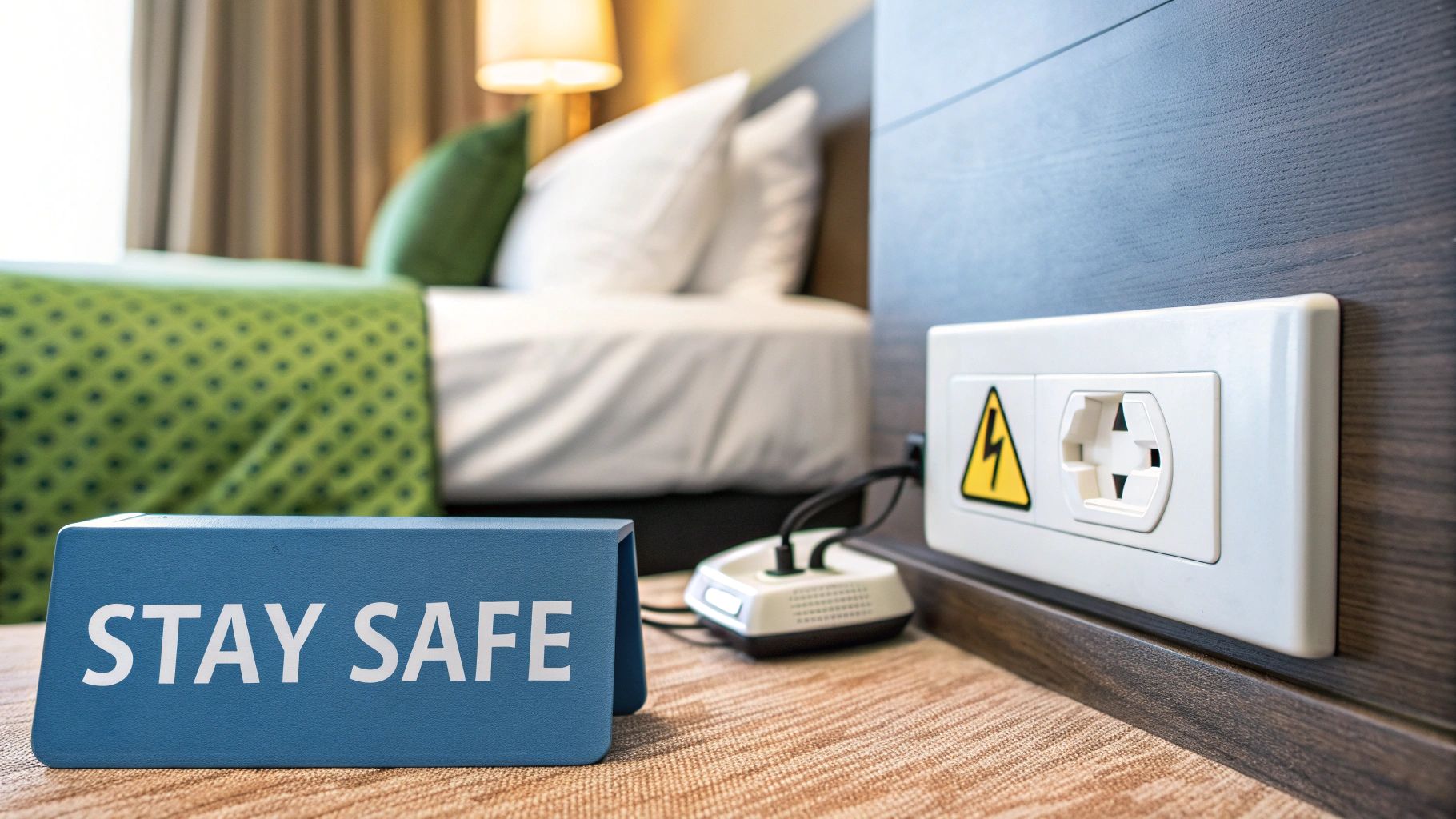
Knowing Egypt uses Type C and F plugs is only half the story. The real priority is using your electronics safely once you are there. It can be tempting to just grab the cheapest adaptor you find at the airport but that is a shortcut that can pose a serious fire risk and might even fry your expensive gadgets.
Always look for adaptors that meet proper safety standards, like BS 8546 in the UK. These have been rigorously tested to handle the correct voltage and current without dangerously overheating. It is a simple step that gives you complete peace of mind, protecting both you and your devices.
Always Check the Voltage Label
This is the single most important check you can make before plugging anything in and it is a habit worth getting into.
Picture this: you plug your UK hairdryer, designed only for 230V , into an Egyptian socket using a simple plug adaptor. Within minutes, the device could overheat, burn out and become completely useless. It is a classic traveller mistake and an avoidable hazard.
Interestingly, market research shows a strange gap in traveller prep. While over 75% of UK holidaymakers heading to Egypt buy an adaptor, only about 20% think to pack a voltage converter. This tells me a lot of people either do not realise the risk or are just hoping all their devices are dual-voltage. That is a gamble that can lead to disappointment and damaged electronics. You can find out more about global electrical standards to see why this is so critical.
A quick glance at the label on your device is all it takes to avoid a costly error. If it does not clearly state ‘INPUT: 100-240V’ , you absolutely must use a voltage converter as well as your plug adaptor.
On top of checking your own gear, be sensible about the local wiring. In older buildings or hotels, the sockets might not be built to handle several high-power devices at once. Try to avoid plugging an extension lead into one socket and loading it up with all your chargers. This simple bit of caution will help prevent tripping the circuit breaker and ensures you have a reliable power source for your essentials throughout your trip, whether that is for a laptop or a mobile EV charging unit.
Your Questions About Egyptian Plugs Answered
To round things out, let’s tackle some of the most common questions travellers have. Think of this as your quick-reference guide to clear up any lingering doubts before you fly.
Can I Use My UK Hairdryer in Egypt?
The first thing you need to do is check the label on your hairdryer. If you see ‘INPUT: 100-240V’, you are in luck. That means it is a dual-voltage device and will work perfectly safely with a simple UK-to-Egypt travel adaptor.
However, if it only lists ‘230V’ or ‘240V’, it is a single-voltage appliance. Trying to use it with Egypt’s voltage will damage it. In this case, you will need a step-down voltage converter in addition to a plug adaptor to prevent it from overheating.
Should I Buy My Travel Adaptor in the UK or in Egypt?
Our strong recommendation is to buy your adaptor in the UK before you leave. This way, you can be sure you are getting a high-quality product that meets British safety standards ( BS 8546 ) and is guaranteed to be compatible with your UK plugs.
While you might be able to find adaptors for sale in Egyptian tourist spots, their quality and safety can be a bit of a lottery. Arriving with the right gear means you can start charging your devices the moment you check in, without any extra hassle.
Do I Need a Separate Adaptor for Each Device?
Not necessarily. Many modern travel adaptors have become incredibly convenient, often coming with multiple USB ports (both USB-A and USB-C) built right in.
This setup allows you to plug the single adaptor into the wall and then charge your phone, tablet and other gadgets directly from it. It is a real space-saver and leaves the main socket free for bigger items like your laptop, which is especially useful in hotel rooms where outlets can be scarce.
Are Type C and Type F Plugs Interchangeable?
Almost, but not quite. A Type C plug (the slim two-pin Europlug) will fit into a Type F socket because the socket is designed to accept it.
However, the reverse is not always true. A Type F plug often will not fit into a dedicated Type C socket. This is because Type C sockets are sometimes recessed and simply do not have the space for the larger, rounder base and side grounding clips of a Type F plug.
Given that most sockets in modern Egyptian buildings are the more accommodating Type F, an adaptor designed for both offers the most flexibility and peace of mind.
At ZPN Energy , we specialise in creating robust energy solutions, from rapid EV charging to grid-scale batteries, designed to perform reliably in any environment. Learn how our integrated systems, including combined on site renewables and distributed energy solutions, can power your next project by visiting us at https://www.zpnenergy.com.


